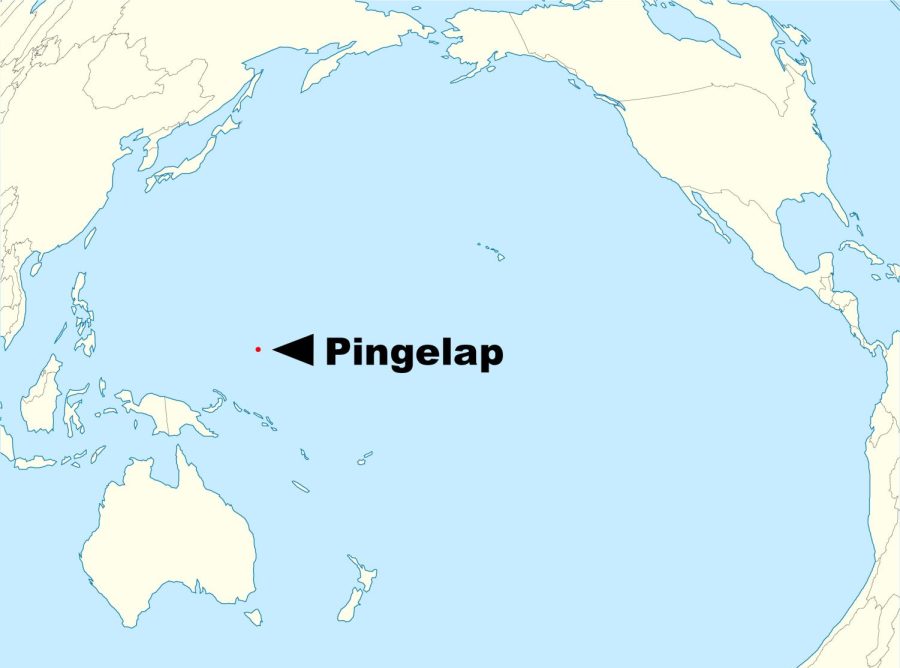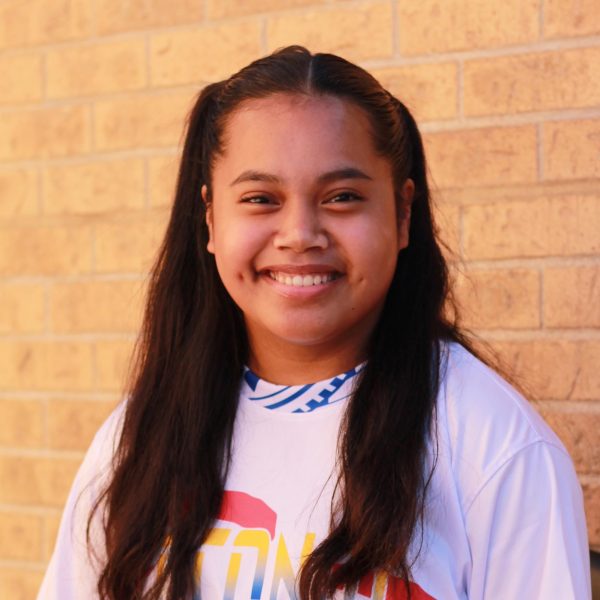English language learning unlocks a bilingual perspective
The language Pingelapese is spoken on the atoll of Pingelap.
Feb 23, 2023
Speaking another language is a huge bragging right on my part, especially since not a lot of people speak more than one language. Though even though it is cool to be bilingual, many hardships come along the way.
When I tell people that English is not my first language, they are surprised. Growing up, speaking my primary language, Pingelapese, a language spoken in the island of Federated States of Micronesia, was easy especially since that’s what I knew. I speak a language that not a lot of people know, only one percent of the world even know where Pingelapese is spoken. When I speak Pingelapese with my cousins and people overhear, they always ask, “Which language is that?’’ or “What is that gibberish?” So it’s always nice to be speaking another language that not many people know so that they won’t suspect what I am saying.
As I aged, I started learning English, which was even harder for me because I was not so used to it. The first time I spoke English when I was seven, it was hard. I was nowhere near being able to speak it fluently until I practiced and practiced and finally got it down. It was hard since there was loads of information coming at me and it was difficult for me to keep up.
I’ve been speaking English now for more than nine years and I’ve gotten better, but it feels like the more I am into this American culture the farther I am from my primary culture. Even though speaking not only one but two languages can be a lifetime struggle, it can come with good surprises. For example, when I am really mad at someone and I want to take my anger out on them. I speak in Pingelapese because not a lot of people know how to speak Pingelapese.
On the other hand, being a bilingual student can also be challenging. It can be difficult to switch between languages, especially in school or at home, where one language may be preferred over another. Switching between languages can be confusing and difficult. It can be a struggle to achieve full literacy in both languages. I’ve been speaking one language over the other all the time. Now it’s been harder to even remember the other language.
I was seven years old when I came to the US. I was young and dumb, so I really didn’t understand that much. I was trying my hardest to keep up with the other students. Not only did I have to speak in English but I also had to write and read in English. My elementary school had enrolled me in ELL, a program where teachers help students whose first language is not English get to know the English grammar. While I was in that class, I still struggled with my English but my teachers told me that I was doing better than other students. Then, fifth grade came around and students in my ELL class were telling me that I was going to pass, but I didn’t believe that rumor because, to me, I was not doing that well, but that rumor turned out to be true and I left ELL. It felt nice to be leaving ELL, but I also felt that I needed more help and there was more to English than reading, writing, or speaking.
When speaking a sentence with friends or family, I switch between both languages and while switching, my mind is racing trying to find perfect words to put into the sentence.
When I finally figure out which word to use, the words that come out of my mouth turn into gibberish. Sometimes I can’t remember easy words even with simple words like shirt or pencil are hard to remember since in both languages they are different. The words don’t come at the right time, especially when speaking to my parents, I need to figure out which language to use. It’s like I want to use my primary language, Pingelapese but it’s just more difficult since I’ve been speaking English for half of my life now. It’s even harder when I am trying to translate expressions that aren’t used in other languages. I can’t speak both English and Pingelapese properly. I have to speak with hesitation. I always have to ask people, “how do you say this in English,” or “ how would you put this into a sentence.”
I am on my way to being trilingual now if I continue to practice German. I am still struggling with just two languages. Imagine if I add in one more. It’s going to be even harder to find which word to use or how do I say this without it sounding like that. It’s cool to speak many languages until you find out that you can’t talk right in either language. It takes a second or even a minute to find the right words. I know this word in Pingelapese, but I don’t know the same word in English.
Talk about having a real struggle.
My perspective changes a lot when I am speaking in English vs. when I am speaking in Pingelapese. When I first started speaking English, it wasn’t just a new language that I was going to be learning for the rest of my life, but it felt like a whole other part of my brain just unlocked. It’s a whole new level of experiencing things outside my own perspective. In a weird way, when I am speaking in English I feel like a new person.
Not only did my perspective open up when I spoke another language but also my vocabulary started getting bigger. I think that is the problem with speaking another language, everything just expands because languages not only contain words but they contain thoughts and emotions.
Translation of audio
Jarliece: hello, my name is Jarliece
Charleen: hello, my name is Charleen
Jarliece & Charleen: We are from Micronesia, Pingelap atoll
Charleen: Hello Jarliece, how are you doing today?
Jarliece: I’m good but a little bit bad.
Charleen: why?
Jarliece: because my brother didn’t go to school but I still had too. What about you? How are you doing today?
Charleen: Today, I’m doing good but a tad bit sad.
Jarliece: why?
Charleen: I didn’t want to come to school but my mom and dad said that I had to come.
Charleen: Jarliece, do you like Pingelap or Nebraska better?
Jarliece: I like Pingelap because there is no snow and the sea is very clean.
Jarliece: What about you, do you like Pingelap or Nebraska?
Charleen: I don’t remember Pingelap that much but I like Pingelap better than Nebraska.
Jarliece: why?
Charleen: Pingelap is so beautiful, there is no trash on the road, and the food is so delicious.
Jarliece: people need to go visit because it is so beautiful.
Charleen: Yeah, yeah, that is a good idea.
Jarliece & Charleen: Goodbye everyone. Thank you


